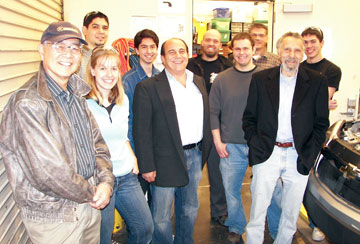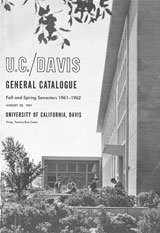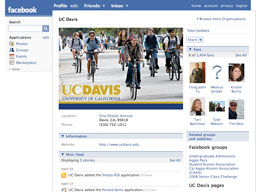Volume 25 · Number 4 · Summer 2008

Professor Andrew Frank, left, and students with Car Talk hosts Ray and Tom Magliozzi, wearing dark blazers, during filming of a NOVA special on future cars.
End Notes
Future Car Talk
Click and Clack brothers Tom and Ray Magliozzi usually answer other people’s questions about cars. But the wisecracking automotive wizards of National Public Radio’s Car Talk were the ones looking for solutions on a recent visit to the UC Davis shop of Professor Andrew Frank.
The Magliozzis were hosting a documentary, Cars of the Future, for PBS’ science program NOVA, which featured Frank’s work in developing a plug-in hybrid that can recharge its batteries through a 110-volt wall socket.
That got the Magliozzis joking about how to plug the car in when they stop overnight at a motel. “They won’t even notice—I love it!—a 50-foot extension cord!” said Tom Magliozzi.
That prompted Ray Magliozzi: “You want your room on the second floor? No, no, we’d prefer to be on the first floor.”
Frank, a professor of mechanical and aeronautical engineering, laughed and agreed that the first floor would be easier, but all that mattered was access to a wall socket. Despite the humor, the underlying point of his more than 20 years of research—and the program itself—was serious: cutting our use of oil.
The Magliozzis spent a full day with Frank, his students and the hybrid car, Trinity, for the 10-minute, 22-second segment of the hour-long NOVA show. Not only did the Car Talk hosts want to look under the hood, they understood how the car worked, Frank said. “They’re smart guys.”
Click here to view a webcast of the program, which first aired on PBS in April.

Catalog Cache
If you should ever need the official title or description for a course you took at UC Davis umpteen years ago, try looking online. The registrar’s office site now has a digital archive of catalogs going back to 1946–47.
Randall Larson-Maynard, who has edited the catalog the past three years, was able to assemble the 61-year series with the help of UC Davis faculty, staff and alumni who sacrificed their assorted collections of catalogs.
The registrar’s office had kept single copies dating from the end of World War II, but solicited the spares because the least-expensive scanning process required slicing off the book bindings.
The project, which cost less than $2,000, had some practical goals, in addition to clearing up some clutter in people’s offices, closets, attics and garages: saving time for employees in the registrar’s office and making it more convenient for alumni who need the course information for advanced-degree or job applications.
Still, despite the worthy cause, some catalog donors found it hard to part with them, Larson-Maynard said. “People would say, ‘I don’t know if I should give it up. I’ve had it for 45 years.’”
The catalog archive can be found here.

Farm vs. Farm at Facebook
Care for a friendly competition with Stanford University?
A new UC Davis page on the Facebook networking site gives alumni and other supporters a chance to make like the 2005 Aggie football team and beat the Cardinal—this time in number of fans.
In its first two months this spring, the UC Davis fan page gained more than 1,700 subscribers—fast closing the gap with Stanford’s 2,173.
Even Gunrock, the Aggie mascot, joined in the fun, posting a message on UC Davis’ “wall” to clarify its horse lineage: “Everyone knows I’m a mustang!”
The page offers some other benefits besides the satisfaction of outnumbering our rivals, including campus news, quick facts, photos, videos, discussion boards and links to UC Davis’ Facebook groups.
Lisa Lapin, assistant vice chancellor for University Communications, said the page will also serve as another channel for communicating emergency information. “That could be helpful for people such as parents, or others interested in campus news, to get that information when they are not part of our regular campus emergency networks.”
Current Facebook users can become fans of UC Davis by visiting the campus’s Facebook page or entering UC Davis in the search field of any Facebook page. New members can register with the site for free.
